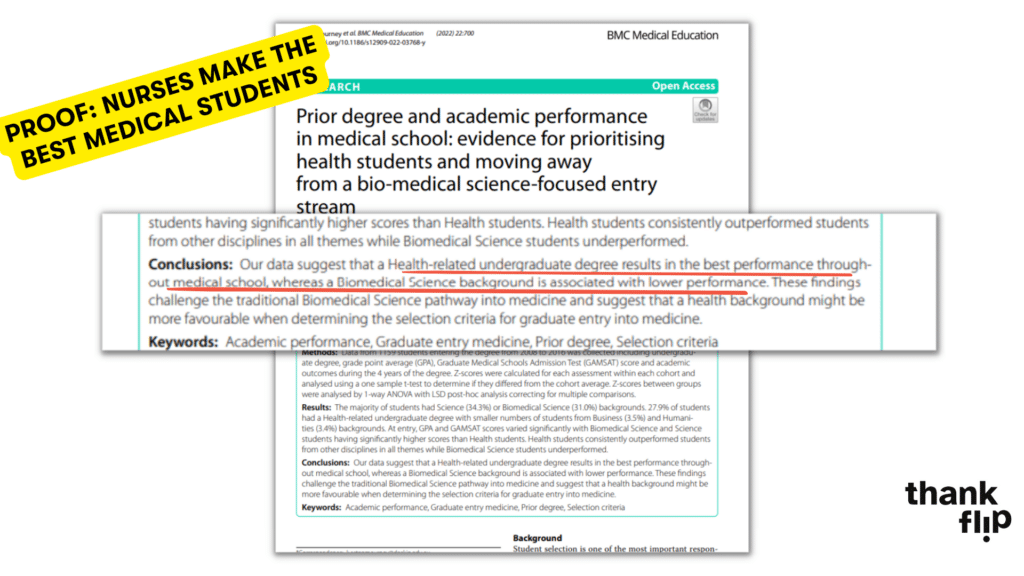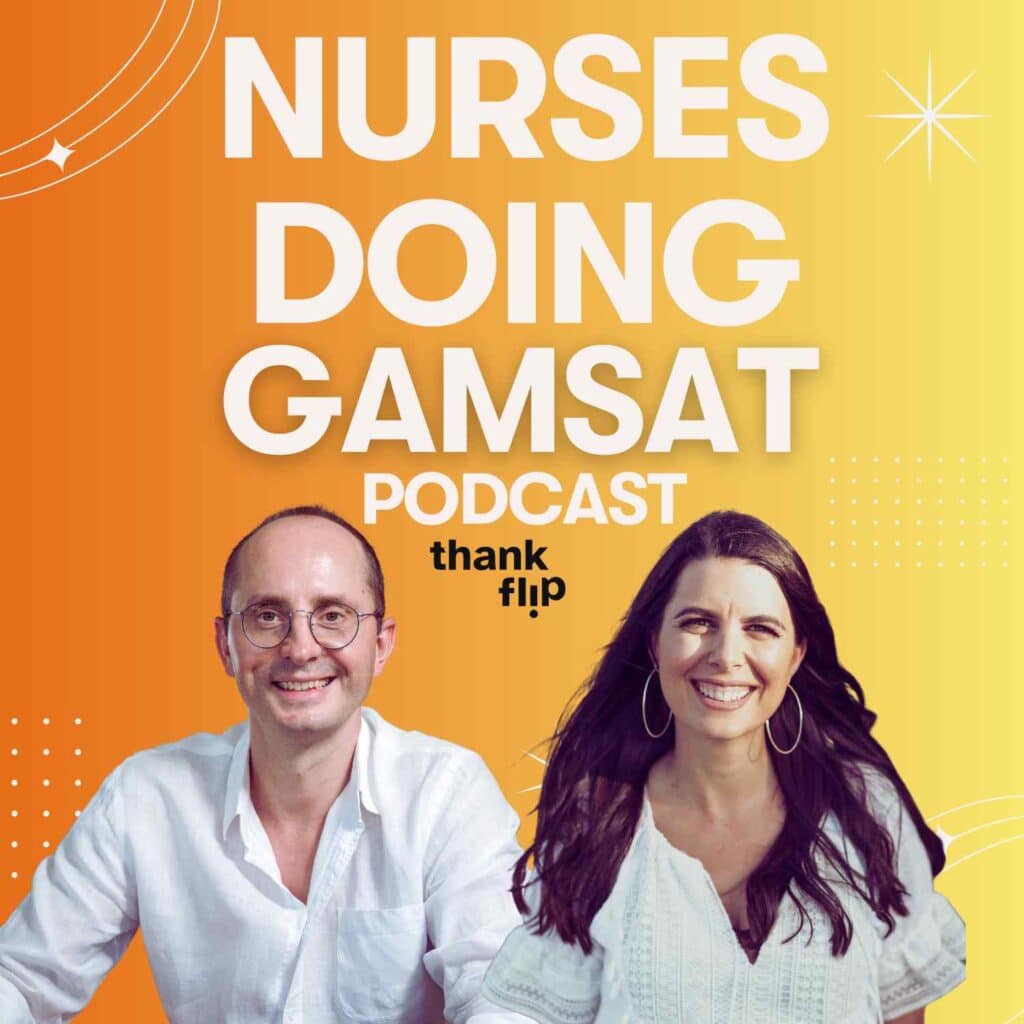In This Episode:
In Episode 2 of the Nurses Doing GAMSAT Podcast, Dr. Tom and Mare explore one of the biggest challenges healthcare professionals face—self-doubt. They discuss how shifting your mindset and focusing on skills rather than knowledge can transform your GAMSAT prep.
With inspiring stories from past students and practical insights into what the GAMSAT is really testing, this episode will leave you feeling empowered to tackle the exam with confidence.
Resources Mentioned:
- The January Jumpstart registration page

Dr. Tom (00:03):
Welcome back, everyone, to the Nurses Doing GAMSAT podcast. This is Episode 2 of the January Jumpstart series. And for those watching the video, I’ve stuck to my word—wearing a shirt Mare could never copy.
Mare Forfa (00:22):
And I’ve worn pink with frills and big shoulders—definitely not your style, Tom.
Dr. Tom (00:34):
Fair enough! So, how’s everyone doing with their New Year’s resolutions? Hopefully, GAMSAT study is on your list. Mare, did you set any resolutions?
Mare Forfa (00:53):
I don’t really do resolutions—I prefer goals. And I start them before the new year so it doesn’t feel like a resolution. In November, I kicked off a new exercise routine. What about you?
Dr. Tom (01:16):
Same here. I like to get things rolling between Christmas and New Year’s. It’s about building momentum early.
Mare Forfa (01:38):
For those starting GAMSAT prep in January, there’s still plenty of time if you act quickly. I’ve helped countless students starting now and achieving great results. As the saying goes, the best time to plant a tree was 20 years ago; the second best time is now.
Dr. Tom (02:07):
Exactly. That’s why we’re doing this January Jumpstart series—to help you prepare for the March or September GAMSAT. In Episode 1, we covered time management, mindset shifts, and practical techniques. Today, we’ll talk about a common issue: self-doubt. Many nurses and healthcare professionals ask, “Am I smart enough?” or “Can I actually get into medicine?” Let’s dive into that.
Mare Forfa (02:42):
Self-doubt is huge. Take Ashley, a nurse from the bush who came to us after a few unsuccessful GAMSAT attempts. Her house was broken into, her job was tough, and she felt stuck. Despite her efforts, her scores weren’t improving. She doubted herself, wondering if she was even capable. But with mindset shifts and practical strategies, she got into Notre Dame University in Fremantle on her first attempt with us.
Dr. Tom (04:42):
You can’t make practical changes without shifting your mindset first. If you don’t believe you can succeed, why would you bother changing anything? The same goes for Bailey, who worked in hospital admin. She sat the UCAT twice and the GAMSAT three times without breaking 60. But with us, she shifted her mindset, implemented better strategies, and scored 70, getting into her top choice: Wollongong University.
Mare Forfa (05:49):
Mindset is key. If you don’t truly believe it’s possible for you, you’ll sabotage yourself. Bailey’s sixth attempt succeeded because she embraced change. If she’d come to us earlier, it might not have taken six tries. Many of you are meant to be doctors, but a mindset block holds you back.
Dr. Tom (07:19):
To overcome self-doubt, reframe how you view the GAMSAT. Understand it’s not a knowledge-based test but a skills-based one. Many approach it like a university science exam—cramming facts. But it’s about developing reasoning skills, not memorizing content. If you’re studying the wrong way, you’ll feel stuck and doubt yourself.
Mare Forfa (08:35):
It’s like training for the Olympics as a cyclist. Knowing everything about bikes won’t make you a champion. You need to master the skill of cycling, refine techniques, and compete at a high level. The same applies to GAMSAT—it’s about building and applying skills.
Dr. Tom (09:51):
Each GAMSAT section tests skills. In Section 1, you interpret complex texts; it’s not about knowing the material. In Section 2, you articulate nuanced arguments. In Section 3, it’s about reasoning through unfamiliar scientific scenarios. These are skills you can develop, regardless of your background.
Mare Forfa (12:57):
Exactly. People think, “I’m not smart enough.” But intelligence isn’t fixed—skills are learnable. Think about what you’ve already learned as a nurse: cannulation, critical thinking, problem-solving. These weren’t innate; you learned them through practice.
Dr. Tom (16:34):
Learning GAMSAT skills works the same way: see how it’s done, practice, get feedback, and improve. Take Annikki, for example. She had no chemistry or physics background, just nursing knowledge. She focused on reasoning skills, increased her Section 3 score by 13 points, and got into Flinders Medical School.
Mare Forfa (18:28):
Annikki’s success shows the power of a growth mindset—believing you can improve and finding solutions. Too many students have a fixed mindset, thinking, “I’m either smart enough or I’m not.” A growth mindset says, “I can figure this out.”
Dr. Tom (21:14):
No one cares about your GAMSAT score once you’re in med school. Patients certainly don’t! They care about your ability to help them. Focus on overcoming challenges, not on arbitrary measures like GPA.
Mare Forfa (24:25):
Speaking of GPA, it’s just a threshold. Most universities require 5.5 or higher, but it’s not a perfect measure of intelligence. If your GPA is lower, a growth mindset helps you find ways to improve. Past scores don’t dictate future success.
Dr. Tom (25:44):
Deakin University found that healthcare grads outperform science grads in med school. Nurses, paramedics, and OTs excel because they’re skilled problem-solvers. You can do this.
Mare Forfa (28:54):
Write down 15 hard things you’ve achieved. It could be graduating, giving birth, or overcoming challenges. Reflect on your resilience. If you can do those things, you can conquer GAMSAT.
Dr. Tom (30:07):
I overcame osteoporosis at 37 through research, problem-solving, and discipline. It was daunting, but step by step, I reversed it. Everyone has faced hard things. Remember those moments when you doubt yourself.
Mare Forfa (35:53):
Share your list in our Slack group. Let’s celebrate your resilience and encourage each other. You’re capable of hard things. Let’s tackle this together.
Dr. Tom (37:50):
In the next episode, we’ll dive into Section 3 reasoning skills. Subscribe and join us for practical tips. Visit thankflipgamsat.com/episode2 for show notes and resources.
Mare Forfa (39:40):
You’ve got this. Nurses, health professionals, paramedics—you’re all capable of making this leap. See you next time!Dr. Tom (40:25):
Bye for now!
Watch Now on YouTube:
Ready to Make This GAMSAT Your Last? Book a FREE 1-on-1 Call Now!
Before You Go — Get Your Freebie!
Click here download The GAMSAT Manifesto — our free GAMSAT study guide that has (so far) helped more than 60,000 people crush this highly unusual exam. Oh yeah, and did we mention…it’s free?




